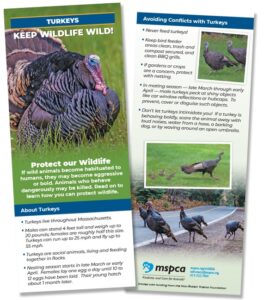-
Adopt
-
Veterinary Care
Services
Client Information
- What to Expect – Angell Boston
- Client Rights and Responsibilities
- Payments / Financial Assistance
- Pharmacy
- Client Policies
- Our Doctors
- Grief Support / Counseling
- Directions and Parking
- Helpful “How-to” Pet Care
Online Payments
Referrals
- Referral Forms/Contact
- Direct Connect
- Referring Veterinarian Portal
- Clinical Articles
- Partners in Care Newsletter
CE, Internships & Alumni Info
CE Seminar Schedule
Emergency: Boston
Emergency: Waltham
Poison Control Hotline
-
Programs & Resources
- Careers
-
Donate Now
 Becoming comfortable around humans can be dangerous for wildlife, so it is important to do everything we can to prevent that from happening. Thanks to a generous grant from the Nion Robert Thieriot Foundation, the MSPCA is proud to be able to offer informational pamphlets on avoiding conflicts with turkeys AT NO CHARGE to any Massachusetts municipality. Learn more on how to request these pamphlets.
Becoming comfortable around humans can be dangerous for wildlife, so it is important to do everything we can to prevent that from happening. Thanks to a generous grant from the Nion Robert Thieriot Foundation, the MSPCA is proud to be able to offer informational pamphlets on avoiding conflicts with turkeys AT NO CHARGE to any Massachusetts municipality. Learn more on how to request these pamphlets.
Wild turkeys have lived in most parts of Massachusetts since Colonial times. Over time, however, human development and hunting took their toll, and by 1851 there were no turkeys left in Massachusetts. Restoration attempts began around 1911 and continued until the population was successfully restored in the late 1990s. Today, you can find wild turkeys living in most parts of Massachusetts.
Turkeys found in Massachusetts have a rich, brown-shaded plumage with a metallic or iridescent sheen and white and black bars on their primary wing feathers. Males, called toms, can stand up to 4 feet tall and weigh more than 20 pounds. Females, called hens, are approximately half the height and weight of males.
Turkeys are social animals, living and feeding together in flocks. They inhabit a wide range of environments, including forested, semi-forested, and open habitat. All turkey habitat, however, must have both trees and grasses for feeding, resting/roosting, and nesting. Trees provide food (nuts, seeds, fruit, etc.) resting areas, cover from predators, and a place to roost at night. Hens with young will roost on the ground until their young are able to fly. Grasses are important for both adult and young turkeys, providing food for both.
Nesting season starts in late March or early April, during which time the hens build their nests on the ground, usually in tall grasses in fields or the forest. The hens lay one egg a day until 10 to 12 eggs have been laid. The average incubation time is 28 days, and in late May or early June the eggs hatch over a 24 to 36 hour period.
During the first 4 weeks of life, baby turkeys, called poults, are unable to fly and rely on their mother for protection. Hens hiss and ruffle their feathers to scare away predators and will only abandon the nest as a last resort. When the poults are between 4 and 5 weeks old, they are able to fly 25 – 50 feet and begin to roost in trees with their mother. Turkeys learn from each other, usually by imitating older birds. Through this process they learn how to find food and how to navigate the boundaries of their home range.
Wild turkeys can fly up to 55 miles per hour and run up to 25 miles per hour. They have several predators, including humans, crows, snakes, skunks, raccoons, and opossums. The average life span of a wild turkey is 3 to 4 years.
POSSIBLE CONFLICTS AND SOLUTIONS
Wild turkeys are social birds who live in flocks, which are organized by “pecking order.” Sometimes turkeys believe humans are part of the “pecking order” and will treat them accordingly. If a turkey views someone as dominant, they will act submissive or fearful. If someone is viewed as a subordinate, however, the turkey may act boldly.
To prevent conflicts with turkeys:
- Do not feed turkeys. Whether intentional or not, feeding wild animals may lead to bold or aggressive behavior.
- Clean up bird feeder areas. Birdseed can attract wild turkeys, as well as other animals, so make sure you clean up spilt seed around bird feeders daily or use a feeder designed to keep seed off the ground.
- Do not be intimidated by turkeys. Bold turkeys can be deterred by loud noises, spray from a water hose, a leashed dog, vigorous waving of your arms, and so on.
- Protect your garden. Turkeys looking for food in your garden can be humanely harassed by, for example, spray from a water hose or a leashed dog. Also, use fencing and netting to protect your garden, and installing a motion sensor on a garden hose will encourage turkeys to look for their next meal elsewhere. Click here to find a list of vendors that sell these attachments.
- Cover shiny/reflective objects during mating season. Male turkeys may peck at windows and car bumpers during mating season (late March/early April) because they think that the reflection they see of themselves is a competing Tom. Covering low windows and glass doors can help deter turkeys from pecking at glass. Rubbing soap on car bumpers to make them less shiny is also effective.
Watch this video, which is one of a series of our humorous takes on how to prevent wildlife conflicts and live humanely with our wild neighbors.
ADDITIONAL RESOURCES




